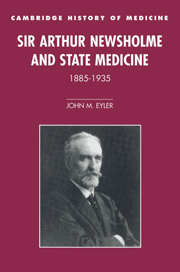Book contents
- Frontmatter
- Contents
- Illustrations
- Preface
- Abbreviations
- PART I THE MEDICAL OFFICER OF HEALTH AND THE LOCAL SANITARY AUTHORITY
- PART II NEWSHOLME AT THE LOCAL GOVERNMENT BOARD
- PART III THE OLD WORLD AND THE NEW: NEWSHOLME AS ELDER STATESMAN
- 12 Newsholme's trans-Atlantic retirement
- 13 Assessments of a career
- Select bibliography
- Index
- Titles in the series
12 - Newsholme's trans-Atlantic retirement
Published online by Cambridge University Press: 04 December 2009
- Frontmatter
- Contents
- Illustrations
- Preface
- Abbreviations
- PART I THE MEDICAL OFFICER OF HEALTH AND THE LOCAL SANITARY AUTHORITY
- PART II NEWSHOLME AT THE LOCAL GOVERNMENT BOARD
- PART III THE OLD WORLD AND THE NEW: NEWSHOLME AS ELDER STATESMAN
- 12 Newsholme's trans-Atlantic retirement
- 13 Assessments of a career
- Select bibliography
- Index
- Titles in the series
Summary
ANSWERS TO THE BIOMETRICIANS
Far from sinking into a quiet retirement when he left Whitehall, Newsholme continued to be professionally very active for a decade and a half. He held a number of those largely honorary appointments reserved for elder statesmen on advisory boards: the Executive Committee of the Imperial Cancer Research Fund, the Board of Governors of the London School of Economics, the Advisory Board of the Johns Hopkins School of Hygiene and Public Health as well as offices in the British Social Hygiene Council and the Society for the Study of Inebriety and Drug Addiction. Most of his great energy, however, was channeled into public speaking and writing. His literary output in this period is remarkable. Between his retirement and his eightieth birth year, 1919 to 1937, he was the sole author of eight books totaling eleven volumes, joint author of one volume, and the author of some three dozen journal articles and chapters in books edited by others. He also brought out a new edition of his textbook on vital statistics and produced two volumes of collected public addresses. His ever-active pen was now directed to new objects. He no longer undertook epidemiological investigation or composed detailed memoranda or official reports. Instead, a fair proportion of his writing and much of his public speaking was now health advocacy and commentary on current policy. The most important of Newsholmes productions in retirement are his comparative international studies of health care systems. To this work he devoted several years to travel, observation, and reading. These writings will be the focus of the last section of this chapter.
- Type
- Chapter
- Information
- Sir Arthur Newsholme and State Medicine, 1885–1935 , pp. 341 - 376Publisher: Cambridge University PressPrint publication year: 1997



